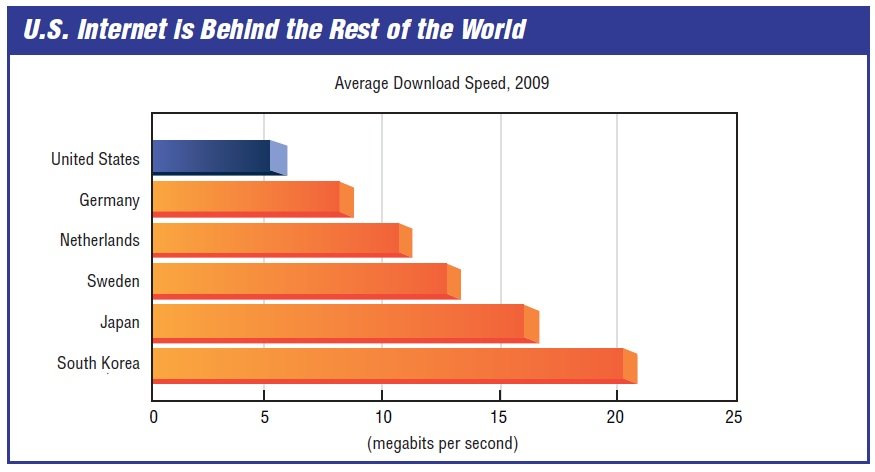The Communications Workers of America released their 2009 Report on Internet Speeds in All 50 States, and the results show the United States continuing to lag well behind other nations in providing citizens with advanced, fast, and affordable connections to the Internet. Little improvement has been made in the past year, when CWA released its 2008 findings. (Stop the Cap! reader Dave passed along word the report was in.)
The average download speed for the nation was 5.1 megabits per second (mbps) and the average upload speed was 1.1 mbps. This was only a nine-tenths of a megabit per second increase (from 4.2 mbps to 5.1 mbps) since last year. At this rate, it will take the United States 15 years to catch up with current Internet speeds in South Korea. And when compared to the rest of the world, the United States ranks 28th in average Internet connection speeds.
The CWA does have an interest in this fight. It’s a labor union whose members work for many of the nation’s telecommunications providers. CWA seeks a national broadband strategy that just happens to fall in line with the interests of consumers — increased speeds, more rural broadband expansion, more affordable access, and Net Neutrality protections. CWA doesn’t take a formal position on Internet Overcharging schemes like usage caps, at least not yet.
The report measured broadband speed based on more than 400,000 Americans who voluntarily participated in a speed test offered on the Speed Matters website. The results were collected and covered a significant part of the country, illustrating real world results of ordinary consumers, not simply the speeds touted by broadband providers in marketing materials.
The CWA report calls out the inadequacy of the deregulated free market approach to deliver broadband service consistently to all Americans. In fact, the disparity of access and the tiny incremental upgrades in speed suggest it will take at least 15 years for the United States to match the speeds enjoyed today in South Korea, which can rightly be called a world leader in broadband even while this country cannot.
South Koreans enjoy an average connection speed of 20.4Mbps (four times faster than the United States). Japan provides residents with 15.8Mbps, Sweden offers 12.8Mbps, the Netherlands 11Mbps, and 24 others who do a better job at delivering speedy broadband than their American counterparts.
Broadband remains too expensive for the slow service we enjoy today. That promotes a digital divide between those affluent enough to afford broadband service and those who are struggling to make ends meet (88% of those earning more than $100,000 a year have service in their homes, while just 35% of those earning under $20,000 subscribe).
Another problem highlighted in the report is the ongoing problem of rural broadband access. While 67% of urban and suburban residents subscribe to broadband, only 46% of rural households do, assuming they can even obtain service.
Rural areas are by far the most likely to encounter slow service, typically 1-3Mbps provided by DSL from the local phone company.
Until 2009, the United States was the only industrialized country in the world without a national broadband plan. The Federal Communications Commission is expected to release one shortly, but only time will tell whether the plan will primarily benefit consumers or the special interests, including providers seeking to protect their monopoly or duopoly market position, and get taxpayer dollars to finance broadband projects that provide slow and expensive service to consumers.
The CWA has some recommendations:
Governmental action — in partnership with the private sector — is essential to stimulate broadband investment and adoption. Other countries are far ahead of us. It is time for the United States to take action.
- Universality. Just as government policies helped bring affordable telephone service to everyone, our policies should ensure that every individual, family, business, and community has access to and can use high speed Internet at a price they can afford — regardless of their income or geographic location.
- High Speed. Speed matters on the Internet. U.S. policies should promote higher Internet speeds and higher capacity networks. The United States should adopt policies to get us to 10 megabits per second upstream and 1 megabit per second downstream by 2010. New benchmarks in succeeding years should expand the number of households capable of sending and receiving multiple channel high-definition video and reach the global standard of 100 mbps.
- Open Internet. We must protect free speech on the Internet so that people are able to go to the websites they want and download or upload what they want when they want on the Internet. There should be no degradation of service or censoring any lawful content on the Internet. At the same time, reasonable network management is necessary to preserve an effective and open Internet. Most important, building high-capacity networks will ensure that all Americans have fast, open access to all content on the Internet.
- Consumer Protections and Good Jobs. Public policies should include consumer and worker protections, should support the growth of good, career jobs, and require the public reporting of deployment, actual speed, price, and service.
Below the jump, we’ve assembled a selection of maps and graphics showing where broadband is today in three of states with our largest reader base — New York, Texas, and North Carolina.


 Subscribe
Subscribe







